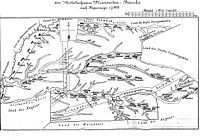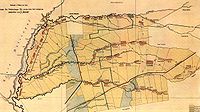- Molotschna
-
Molotschna Colony was a Russian Mennonite settlement in what is now Zaporizhia Oblast (province) in Ukraine. Today is called Molochansk with a population of under 10,000. The settlement is named after the Molochna River which forms its western boundary. Today the land mostly falls within the Tokmatskyi and Chernihivskyi Raions. The nearest large city is Melitopol to the southwest of Molotschna.
Molotschna was founded in 1804 by Mennonite settlers from West Prussia and consisted of 57 villages. The city initially was called Halbstadt (Half-city). It was the second and largest settlement of Mennonites in Russia. With the retreat and deportation of Germans living in these villages at the end of World War II, that area is now populated by Ukrainians and Russians.
Contents
History
See also: KhortytsiaAfter the first Mennonite colony in Russia, Chortitza, was founded in 1789, Mennonite visitors found the freedoms and free land of Russia an attractive alternative in view of restrictions placed on them in West Prussia. The Russian government wanted more settlers with the valuable agricultural and craft skills of the Mennonites. In 1800 Paul I of Russia enacted a Privilegium (official privileges) for Mennonites granting them exemption from military service "for all time." In West Prussia King Frederick William III was making it difficult for Mennonites to acquire land, because of their refusal to serve in the military. Another reason to immigrate was fear of the changes brought about by the French Revolution. Refuge in Russia was seen as a more secure alternative.
The first settlers, 162 families, came in 1803 to the existing Chortitza settlement and over-wintered there. The first villages were founded in 1804. The Russian government set aside a 1,200 km2 (297,000 acres) tract of land for the settlers along the Molotschna River in the Taurida Governorate.[1] The next year an additional group of about the same size arrived. Each family received 0.7 km2 (170 acres) of land.[2] In contrast to the settlement of Chortitza, wealthy Mennonites also immigrated. They sold their farms, paid a 10% emigration tax and brought the remainder to Russia. Arriving with superior farming skills and more wealth, new farms and businesses were created more easily than had been the case in Chortitza. The seaport city of Taganrog provided a convenient market for their dairy products in the early years and wheat which became the dominant crop later.
Between 1803 and 1806, 365 families came to Molotschna. Further immigration was prevented during the Napoleonic Wars. Another 254 families came from 1819-20. After 1835 immigration to Molotschna ended, with about 1200 families totaling some 6000 people moving from Prussia. The settlement consisted of 1,750 km2 (432,000 acres) of land with 46 villages and total population of about 10,000.[1] A part of this was not divided but reserved for future generations, to care for the growing number of families. As the population outgrew the available land, daughter colonies such as Neu Samara Colony were formed.
The settlement was located near Russia's frontier and was thus subject to raids by nomadic Crimean Tatars who had been removed from the Molotschna Valley by the Russian government. After four Mennonites were killed by a raiding party, the government banned their spiked and weighted pole weapon which they frequently used on hunting expeditions.[3] Later Mennonites and their neighbors coexisted peacefully.
Local government
Mennonite colonies were self-governing with little intervention from the Russian authorities. The village, the basic unit of government, was headed by an elected magistrate who oversaw village affairs. Each village controlled its own school, roads and cared for the poor. Male landowners decided local matters at village assemblies.
Villages were grouped into districts. Molotschna was divided into two districts: Halbstadt and Gnadenfeld. A district superintendent headed a regional bureau that could administer corporal punishment and handle other matters affecting the villages in common. Insurance and fire protection were handled at the regional level, as well as dealing with delinquents and other social problems. The Mennonite colonies functioned as a democratic state, enjoying freedoms beyond those of ordinary Russian peasants.[4]
Education
At a time when compulsory education was unknown in Europe, the Mennonite colonies formed an elementary school in each village. Students learned practical skills such as reading and writing German and arithmetic. Religion was included as was singing in many schools. The teacher was typically a craftsperson or herder, untrained in teaching, who fit class time around his occupation.
In 1820 the Molotschna colony started a secondary school at Ohrloff, bringing a trained teacher from Prussia. A school of commerce was started in Halbstadt employing a faculty with full graduate education. Those who wanted to pursue post-secondary education attended universities in Switzerland, Germany as well as Russia.
Johann Cornies
Johann Cornies was perhaps Molotschna's most noted resident. His large estate, Jushanlee, was a model farm and showplace of south Russia. Crown princes Alexander I and Alexander II as well as other government officials visited the estate. His holdings were expanded by gifts from the government for his services and totaled 100 km2 (25,000 acres) at his death. He owned a large herd of thoroughbred cattle, 8000 merino sheep and four hundred horses.[5]
Daughter colonies
As the population of the colony grew and land became scarce, new areas for resettlement were sought. Starting in 1862 settlers from Molotschna formed daughter settlements in Crimea, which by 1926 consisted of 25 villages with a total population of 5000.[6] In 1871 the Molotschna colony purchased 240 km2 (59,000 acres) to form the Zagradovka colony in Kherson Oblast.[7] By 1918 Zagradovka was made up of 16 villages with 6000 residents.[6]
In the 1870s the population pressure was eased somewhat when a significant portion of the colony migrated to North America. The next daughter colony was formed at Memrik in the Dnipropetrovsk region in 1885. By 1926 this settlement had a population of about 3500, occupying 100 km2 (25,000 acres).[6][8]
Selbstschutz
Through influence of the short German occupation of Ukraine in 1918, the young men of Molotschna formed a self-defense group (Selbstschutz) for protection of the villages. German soldiers provided training and left weapons and ammunition behind when they left. Together with a neighboring Lutheran colony, they formed twenty companies totaling 2700 infantry and 300 cavalry, which held back the forces of Makhno until March 1919. When the Red Army combined with Makhno, the self-defense group was forced to retreat to Halbstadt and disband. This attempt to defend the villages departed from the Mennonites' traditional teaching of nonresistance and was disapproved by many colonists. However, in the absence of effective governmental authority and when faced with the horrific atrocities committed by anarchist partisans, many others came to believe in the necessity of self defence. Later church conferences and delegations officially condemned this action as a "grave mistake".[9][10]
Famine
Mennonites of Molotschna sent a commission to North America in the summer of 1920 to alert American Mennonites of the dire conditions of war-torn Ukraine. Their plight succeeded in uniting various branches of Mennonites to form Mennonite Central Committee in an effort to coordinate aid.
The new organization planned to provide aid to Ukraine via existing Mennonite relief work in Istanbul. The Istanbul group, mainly Goshen College graduates, produced three volunteers, who at great risk entered Ukraine during the ongoing Russian Civil War. They arrived in the Mennonite village of Halbstadt just as General Wrangel of the White Army was retreating. Two of the volunteers withdrew with the Wrangel army, while Clayton Kratz, who remained in Halbstadt as it was overrun by the Red Army, was never heard from again.
A year passed before official permission was received from the Soviet government to do relief work among the villages of Ukraine. Kitchens provided 25,000 people a day with rations over a period of three years beginning in 1922, with a peak of 40,000 servings during August of that year. Fifty Fordson tractor and plow combinations were sent to Mennonite villages to replace horses that had been stolen and confiscated during the war. The cost of this relief effort was $1.2 million.[11]
Evacuation
The residents of Molotschna shared the fate of the Chortitza settlers. They were evacuated to Nazi Reichsgau Wartheland in 1943, and from there marched into Germany, only to be repatriated to the Soviet Union by the Red Army where they were exiled to Siberia and Kazakhstan.
Villages
About 57 villages were founded:
Name Local name Founded 1. Halbstadt[12] Molochansk 1804 2. Neu-Halbstadt 1804 3. Muntau 1804 4. Schönau 1804 5. Fischau 1804 6. Lindenau 1804 7. Lichtenau 1804 8. Blumstein 1804 9. Münsterberg 1804 10. Altona 1804 11. Ladekopp 1805 12. Schönsee 1805 13. Petershagen 1805 14. Tiegenhagen 1805 15. Ohrloff 1805 16. Tiege 1805 17. Blumenort 1805 18. Rosenort 1805 19. Fürstenau 1806 20. Rückenau 1811 21. Margenau 1819 22. Lichtfelde 1819 23. Neukirch 1819 24. Alexandertal 1820 25. Schardau 1820 26. Pordenau 1820 27. Mariental 1820 28. Rudnerweide 1820 29. Grossweide 1820 30. Franztal 1820 31. Pastwa 1820 32. Alexanderwohl 1820[1] 33. Fürstenwerder 1821 34. Gnadenheim 1821 35. Tiegerweide 1822 36. Liebenau 1823 37. Elisabethtal 1823 38. Wernersdorf 1824 39. Friedensdorf 1824 40. Prangenau 1824 41. Sparrau 1838 42. Konteniusfeld 1832 43. Gnadenfeld 1835[1] 44. Waldheim 1836 45. Landskrone 1839 46. Hierschau 1848 47. Nikolajdorf 1848 48. Paulsheim 1852 49. Kleefeld 1854 50. Alexanderkrone 1857 51. Mariawohl 1857 52. Friedensruh 1857 53. Steinfeld 1857 54. Gnadental 1862 55. Hamburg 1863 56. Klippenfeld 1863 57. Fabrikerwiese 1863
See also
- Askania Nova
Notes
- ^ a b c d Smith, p. 258.
- ^ Smith, p. 262.
- ^ Smith, p. 259.
- ^ Smith, p. 268.
- ^ Smith, p. 264
- ^ a b c Smith, p. 304.
- ^ Lohrenz, Gerhard (1959). "Zagradovka Mennonite Settlement (Kherson Oblast, Ukraine)". Global Anabaptist Mennonite Encyclopedia Online. http://www.gameo.org/encyclopedia/contents/Z14.html. Retrieved 2010-10-06.
- ^ Krahn, Cornelius (1957). "Memrik Mennonite Settlement (Dnipropetrovsk Oblast, Ukraine).". Global Anabaptist Mennonite Encyclopedia Online. http://www.gameo.org/encyclopedia/contents/M46040.html. Retrieved 2010-10-06.
- ^ Smith, p. 316.
- ^ Krahn, Cornelius and Al Reimer (1989). "Selbstschutz". Global Anabaptist Mennonite Encyclopedia Online. http://www.gameo.org/encyclopedia/contents/S444ME.html. Retrieved 2010-10-06.
- ^ Smith, p. 320.
- ^ The center of the Molotschna settlement.
References
- Smith, C. Henry (1981). Smith's Story of the Mennonites. Newton, Kansas: Faith and Life Press. pp. 249–356. ISBN 0-87303-069-9.
External links
- Molotschna Mennonite Settlement (Zaporizhia Oblast, Ukraine) in Global Anabaptist Mennonite Encyclopedia Online
- Russian Mennonite Genealogical Resources
Coordinates: 47°11′51″N 35°37′56″E / 47.1975°N 35.63222°E
German people Historical 
Diaspora EuropeTransylvanian Saxons / Landler · Danube / Banat / Satu Mare Swabians · Dobruja · Zipser · Regat · Bessarabia · BukovinaElsewhereCzech Republic (Sudetenland) · Hungary · Bessarabia · Poland · Russia (Volga · Russian Mennonite) · Slovakia · Slovenia (Gottschee County) · Ukraine (Black Sea · Bukovina · Crimea)Balkans and SoutheasternElsewhereArgentina · Bolivia · Brazil · Canada (Hutterites) · Chile · Cuba · Jamaica · Mexico · Paraguay · Peru · United States (Pennsylvania Dutch · Texas · Palatines · Puerto Rico)AfricaNamibia · South Africa (Afrikaners)AsiaOceaniaSee also Categories:- Mennonitism in Ukraine
- Zaporizhia Oblast
- Populated places established in 1804
- History of Ukraine
- Ukrainian culture
- Russian and Soviet-German people
Wikimedia Foundation. 2010.


